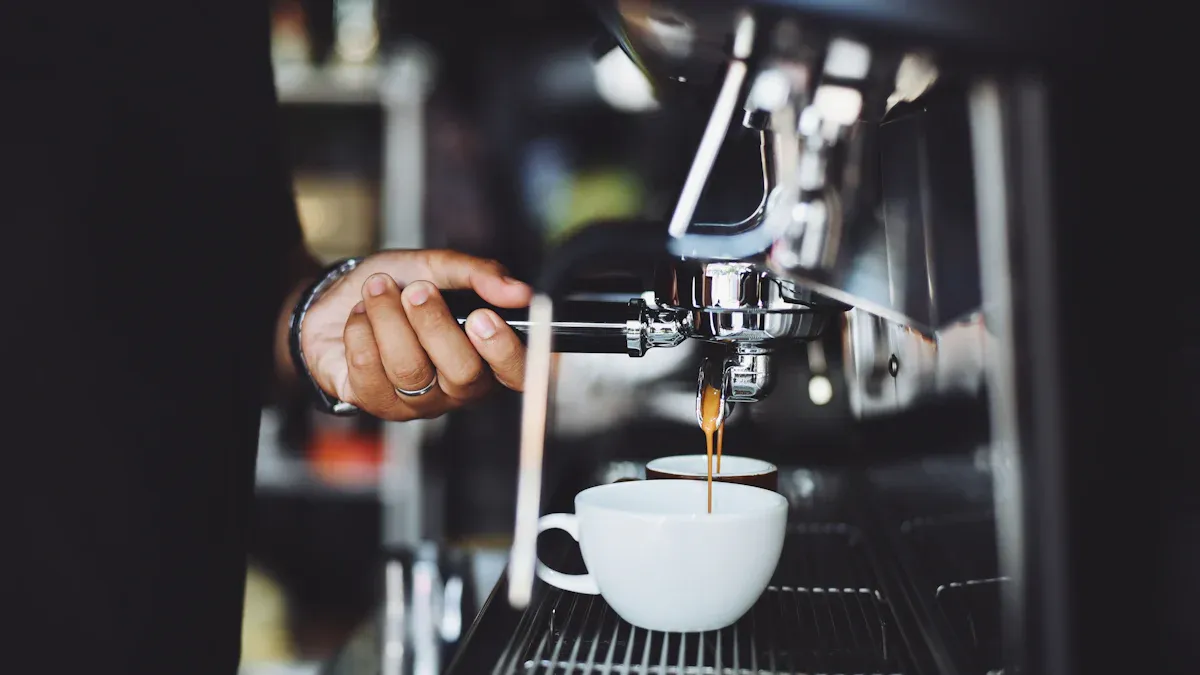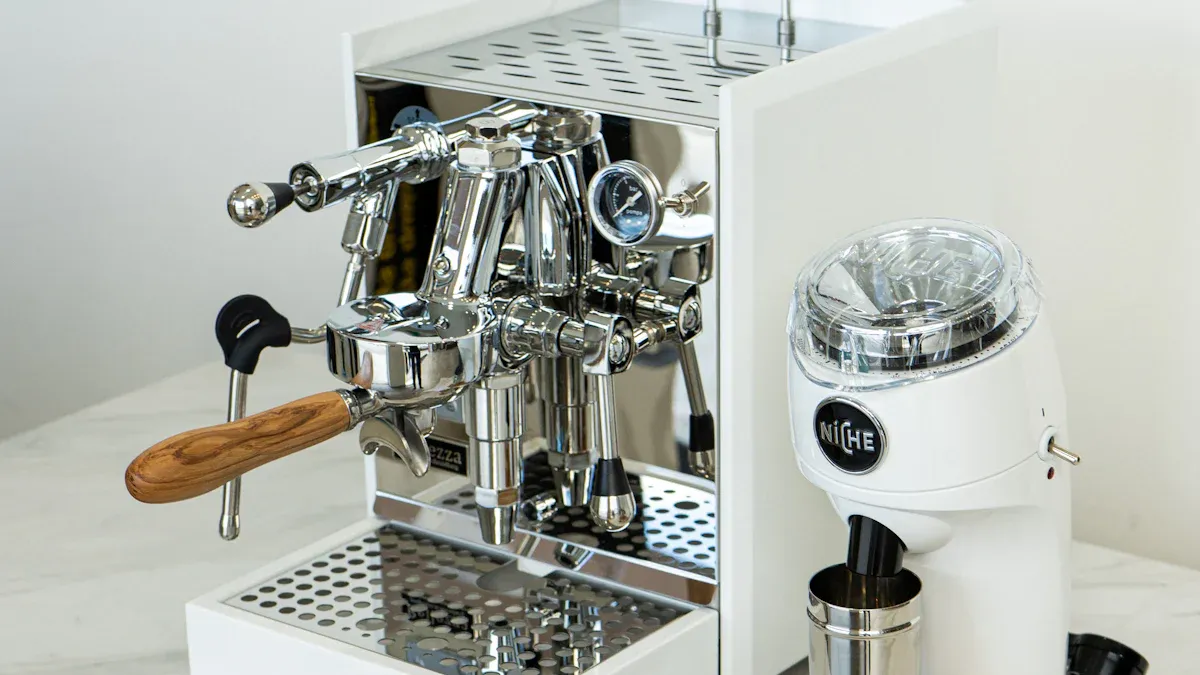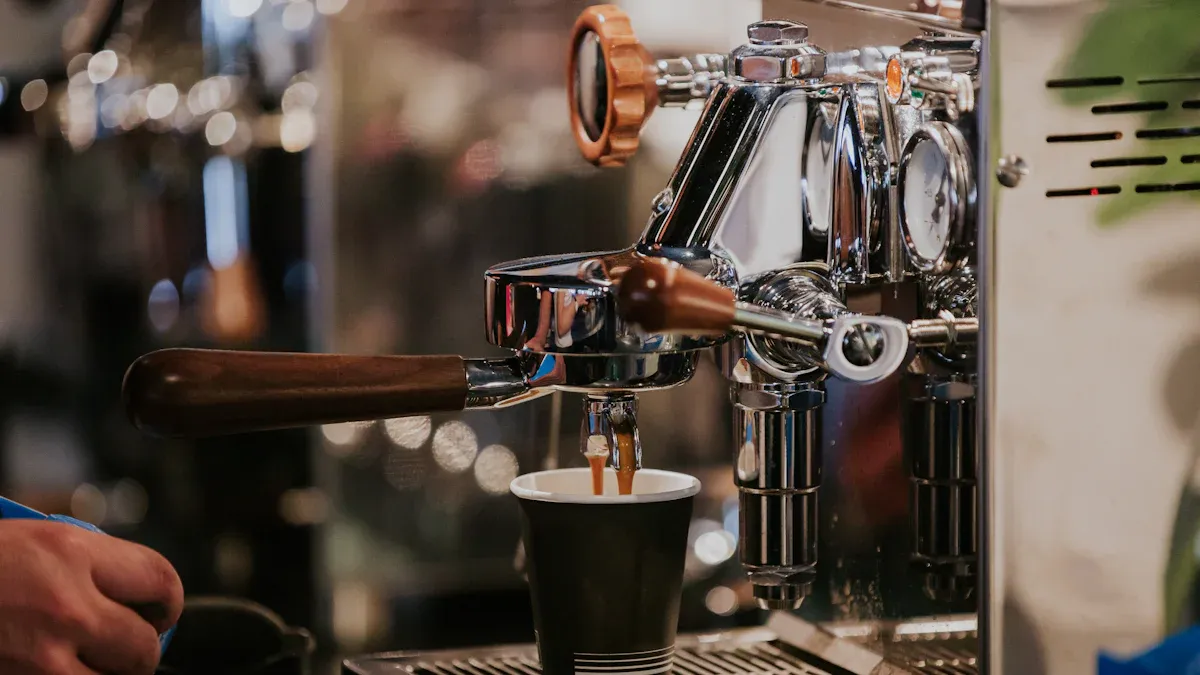
Innovation drives progress in the world of automatic coffee machines, as highlighted in the ‘White Paper: Innovations in Automatic Coffee Machine Technology,’ revolutionizing how people brew and enjoy their favorite beverages. As coffee consumption grows globally, consumers increasingly demand convenience and quality. Fully automatic machines meet this need with features like smart connectivity and precise brewing. These advancements not only enhance performance but also align with modern lifestyles, which prioritize speed and efficiency. Additionally, the rise of home brewing and specialty coffee culture reflects how technology empowers individuals to create café-quality drinks effortlessly. By merging sustainability with user-centric designs, these machines set new standards for eco-conscious coffee enthusiasts.
Key Takeaways
- Automatic coffee machines make brewing at home easy and tasty.
- Smart features let users control machines from anywhere, making it fun.
- AI helps create custom coffee recipes to match personal tastes.
- New machines save energy and cut waste, helping the environment.
- Changeable parts let users upgrade without buying a whole new machine.
The Evolution of Automatic Coffee Machines
Early Innovations Shaping Coffee Machine Technology
The journey of automatic coffee machines began in the late 19th century. Angelo Moriondo’s steam-powered machine, invented in the 1880s, laid the foundation for modern coffee brewing. This innovation significantly reduced brewing time, although it lacked the quality of true espresso. By the early 20th century, the La Pavoni Ideale introduced commercial espresso machines, improving coffee freshness but raising safety concerns. These early advancements demonstrated the potential of automation in coffee preparation, setting the stage for future breakthroughs.
In 1961, the E61 espresso machine revolutionized the industry. It introduced an electric pump and heat exchanger, enhancing both safety and efficiency. This milestone marked a turning point, as coffee machines became more reliable and user-friendly. The rise of one-touch technology in the late 1990s further transformed the landscape, making high-quality coffee accessible to a broader audience.
Automation and Its Impact on Coffee Preparation
Automation has redefined coffee preparation by eliminating manual processes and ensuring consistency. Super automatic espresso machines, which emerged in the late 1990s, automated grinding, tamping, and brewing. This innovation not only simplified the process but also allowed users to enjoy café-quality coffee at home. The role of baristas shifted from manual labor to overseeing operations, emphasizing creativity and customer interaction.
Modern machines now incorporate features like programmable settings and smart connectivity. These advancements enable users to customize their coffee with precision, catering to individual preferences. Automation has also improved efficiency in commercial settings, reducing wait times and enhancing customer satisfaction.
Key Milestones in the Development of Modern Machines
The evolution of coffee machines is marked by several key milestones:
- Late 1880s: Angelo Moriondo’s steam machine introduced faster brewing.
- 1940s-1950s: The Gaggia Classico delivered true espresso with crema, a hallmark of quality.
- 1960s: The La Faema E61 introduced an electric pump, revolutionizing espresso machines.
- Late 1990s: Super automatic machines automated the entire brewing process.
Statistical data highlights the technological advancements in modern machines. For instance, the Jura GIGA X8 recorded 92,449 electrical events lasting over one second, while the Jura GIGA X9 logged 278,151 events. These figures demonstrate the precision and reliability of contemporary coffee machines, which continue to push the boundaries of innovation.
Cutting-Edge Innovations in Automatic Coffee Machines

IoT Integration and Smart Connectivity
The Internet of Things (IoT) has transformed automatic coffee machines into smart devices that seamlessly integrate with modern lifestyles. By connecting to mobile apps, these machines allow users to control brewing parameters remotely. Whether at home or on the go, individuals can schedule brewing times, adjust settings, and monitor performance with ease. This level of convenience aligns with the growing demand for smart home ecosystems.
IoT-enabled coffee machines also enhance precision. Servo motors, for example, regulate grind size, water temperature, and brewing time, ensuring consistent quality in every cup. These features not only improve user experience but also cater to coffee enthusiasts who value customization. According to market data, IoT connectivity has significantly boosted user satisfaction by offering remote control and real-time monitoring capabilities.
| Key Benefit | Description |
|---|---|
| Enhanced User Experience | IoT connectivity allows remote control and monitoring via a mobile app, improving user interaction. |
| Precision in Brewing | Servo motors control grind size, water temperature, and brewing time for consistent quality coffee. |
| Convenience | Users can customize brewing parameters and initiate brewing from any location, adding to convenience. |
AI-Powered Brewing and Customization
Artificial intelligence (AI) has redefined the way coffee is brewed. By analyzing user preferences, AI-powered machines can create personalized coffee recipes. These machines learn from past brewing data, enabling them to adjust variables like temperature, pressure, and extraction time automatically. This ensures that every cup meets the user’s exact taste preferences.
AI also enhances machine efficiency. Features such as real-time performance tracking and maintenance notifications keep the machine running optimally. Users can monitor brewing variables through an app, ensuring consistent quality. Additionally, energy-saving features like automatic shut-off contribute to sustainability, making these machines an eco-friendly choice.
- Key features of AI-powered coffee machines include:
- Real-time performance tracking for variables like temperature and pressure.
- Customization options that allow users to save brewing recipes.
- Maintenance notifications to ensure longevity and performance.
- Energy-saving features that reduce power consumption.
These advancements highlight how AI bridges the gap between technology and user satisfaction. By combining innovation with functionality, AI-powered coffee machines elevate the coffee experience to new heights.
Precision Brewing for Consistent Quality
Precision brewing has become a cornerstone of modern coffee machine technology. By controlling variables such as water temperature, pressure, and extraction time, these machines deliver consistent quality in every cup. Empirical studies confirm that precision brewing significantly impacts sensory qualities like taste and aroma, making it a preferred choice for coffee aficionados.
| Evidence Type | Findings | Impact on Coffee Quality |
|---|---|---|
| TDS | Significant impact on sensory qualities | Confirms advantages of precision brewing |
| PE | Noticeable impact on sensory qualities | Supports consistency in coffee quality |
Advanced brewing technologies, such as servo-controlled systems, further enhance precision. These systems ensure that each brewing cycle adheres to exact specifications, eliminating inconsistencies. As a result, users can enjoy café-quality coffee at home, every time.
The “White Paper: Innovations in Automatic Coffee Machine Technology” underscores the importance of precision brewing in meeting consumer expectations. By prioritizing quality and consistency, manufacturers continue to push the boundaries of what automatic coffee machines can achieve.
Sustainability in Coffee Machine Technology

Energy Efficiency in Modern Coffee Machines
Energy efficiency has become a cornerstone of sustainability in coffee machine technology. Modern machines are designed to minimize power consumption without compromising performance. Features like automatic shut-off and energy-saving modes ensure that machines consume electricity only when necessary. These innovations not only reduce energy bills but also lower the carbon footprint of coffee enthusiasts.
Manufacturers have also embraced advanced heating systems, such as thermoblock technology, which heats water on demand. This eliminates the need to keep water continuously heated, significantly reducing energy waste. Additionally, some machines now utilize smart sensors to detect inactivity and switch to standby mode automatically. These features align with the growing demand for eco-conscious appliances in households and commercial spaces.
Reducing Waste with Smart Systems
Waste reduction is another critical focus in sustainable coffee machine technology. Smart systems now enable users to minimize waste by optimizing coffee grounds usage and water consumption. For instance, machines equipped with precise dosing mechanisms ensure that only the required amount of coffee is used for each brew. This not only enhances flavor consistency but also reduces the amount of coffee wasted.
Some machines also feature built-in recycling systems for coffee grounds. These systems allow users to repurpose used grounds as compost or fertilizer, promoting a circular economy. Furthermore, water-saving technologies, such as drip irrigation-inspired systems, ensure that every drop of water is utilized efficiently. These advancements reflect a commitment to reducing environmental impact while maintaining high-quality coffee experiences.
Eco-Friendly Materials and Manufacturing Practices
The materials and manufacturing processes used in coffee machines have a significant impact on the environment. Many manufacturers now prioritize eco-friendly materials, such as recycled plastics and stainless steel, to reduce resource depletion. These materials not only enhance the durability of the machines but also contribute to a more sustainable production cycle.
In addition to material choices, manufacturers are adopting greener manufacturing practices. Techniques like energy-efficient production lines and waste recycling during manufacturing help minimize the environmental footprint. Agroforestry systems, which integrate trees and crops, also play a role in sustainable coffee production by improving soil fertility and reducing pest issues. By embracing these practices, the coffee machine industry supports a healthier planet while meeting consumer demands for sustainable products.
Post time: Apr-15-2025
